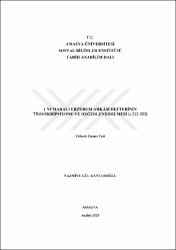| dc.contributor.advisor | Karadeniz, Yılmaz | |
| dc.contributor.author | Kantaroğlu, Nazmiye Gül | |
| dc.date.accessioned | 2022-03-09T14:55:57Z | |
| dc.date.available | 2022-03-09T14:55:57Z | |
| dc.date.issued | 2019 | |
| dc.identifier.uri | https://tez.yok.gov.tr/UlusalTezMerkezi/TezGoster?key=aEzj_IdWAsjiSAfK3qwrBhuwO0czj2STJ_E78iZxjlcsMppBiYuKpd-o7qNh9owl | |
| dc.identifier.uri | https://hdl.handle.net/20.500.12450/1747 | |
| dc.description.abstract | Osmanlı Devlet sisteminde adalet önemli bir yere sahiptir. Adaletin sağlayıcısı ise hükümdardır. Bu görev onun adına adli ve idari görevliler tarafından yürütülmektedir. Bu sebeple zulme ve haksızlığa uğrayan halk, hükümdara veya onun yetki verdiği kurumlara müracaat edebilmektedir. Bu kurumların en önemlisi Divan-ı hümayundur. Bu kuruma gelen şikâyetler ilk dönemlerde Mühimme defterine kaydedilirken 1649'dan itibaren farklı defterlere tutulmaya başlanmıştır. Bu sebeple halka ait şikâyetler "Şikâyet Defterleri" adı altında yeni bir deftere tutulması ön görülmüştür. Öte yandan devlet otoritesinin XVIII. yüzyılda zayıflamasıyla şikâyetlerde artış olmuştur. Netice de kayıtlara daha hızlı ulaşmak isteğinden dolayı Ahkâm defterleri ortaya çıkmıştır. Bu defterlerden biri de 1 Numaralı Erzurum Ahkâm defteridir. Bu tez çalışmasında 1 Numaralı Erzurum Ahkâm defterindeki 212-293 sayfalar arasındaki hükümler transkrip edilerek günümüz alfabesine çevrilmiştir. Öte yandan transkrip edilen hükümler konularına göre ayrılarak özetlenmiş ve bu konular hakkında bilgi verilmiştir. Bu sayede Erzurum eyaletinin XVIII. yüzyıldaki sosyal, kültürel ve ekonomik durumu yansıtılmaya çalışılmıştır. | en_US |
| dc.description.abstract | Justice has an important place in the Ottoman state system. The provider of justice is the sovereign. This task is carried out by judicial and administrative officials on his behalf. For this reason, the people who have been subjected to persecution and injustice can apply to the ruler or the institutions authorized by him. The most important of these institutions is the Divan-ı Hümayund. Complaints to this institution were recorded in the Mühimme defter in the early periods and started to be kept in different books from 1649 onwards. For this reason, it is envisaged that the complaints of the public be kept in a new defter under the name of Şikayet Defteri ". On the other hand, the state authority XVIII. There was a tremendous increase in complaints with the weakening in the 21st century. As a result, in 1742, the Ahkâm Defters were created to keep the records of each region separately. One of these defters is the 1 Numaralı Erzurum Ahkâm Defteri. In this thesis, the provisions between pages 212-293 in the 1 Numaralı Erzurum Ahkâm Defteri were transcribed and translated into the present alphabet. On the other hand, transcribed provisions were summarized and summarized according to their subjects and information was given about these issues. In this way, XVIII. century, social, cultural and economic situation | en_US |
| dc.language.iso | tur | en_US |
| dc.publisher | Amasya Üniversitesi | en_US |
| dc.rights | info:eu-repo/semantics/openAccess | en_US |
| dc.subject | Tarih | en_US |
| dc.subject | History | en_US |
| dc.title | 1 numaralı Erzurum ahkâm defterinin transkripsiyonu ve değerlendirilmesi (s.212-293) | en_US |
| dc.title.alternative | Transcryption and evaluation of Erzurum ahkâm defter with number 1 (p. 212-293) | en_US |
| dc.type | masterThesis | en_US |
| dc.department | Enstitüler, Sosyal Bilimler Enstitüsü, Tarih Ana Bilim Dalı | en_US |
| dc.identifier.startpage | 1 | en_US |
| dc.identifier.endpage | 374 | en_US |
| dc.identifier.yoktezid | 605306 | en_US |
| dc.institutionauthor | Kantaroğlu, Nazmiye Gül | |


















